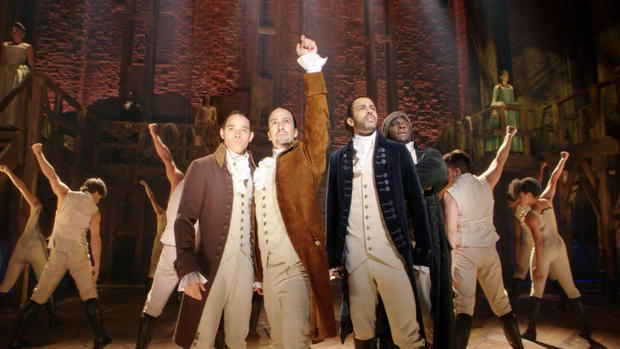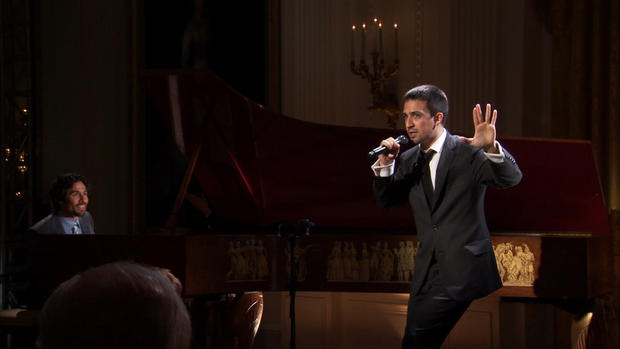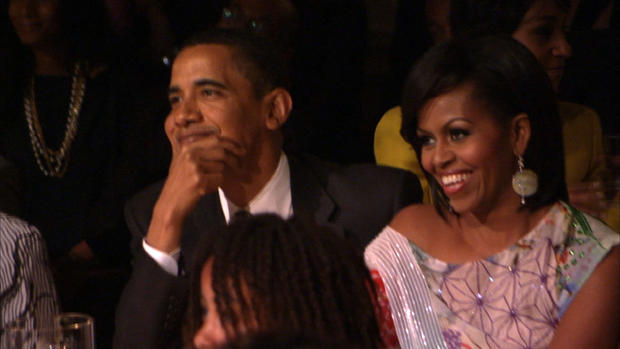The following is a script from "Hamilton" which aired on Nov. 8, 2015. Charlie Rose is the correspondent. Graham Messick, producer.
Imagine the pitch: a Broadway musical about the life and times of founding father Alexander Hamilton and his contemporaries. They are played by a young, multiracial cast; dancing, singing and rapping to hip hop and popular music. This unlikely combination is called "Hamilton" and it is being hailed as a theatrical "game-changer."
"Hamilton" is the brainchild of a 35-year-old playwright named Lin-Manuel Miranda. He also composed the music, and plays the title character. Miranda worked six years on the project. His biggest challenge was fitting the immense story of one of the most brilliant and misunderstood men in American history into a single evening of musical theater.
Lin-Manuel Miranda: The thing about Hamilton is he spoke in paragraphs. So the opening sentence of our show is this crazy, run-on sentence. "How does a bastard orphan, son of a whore and a Scotsman, dropped in the middle of a forgotten spot in the Caribbean by providence, impoverished in squalor, comma, grow up to be a hero and a scholar?" That's the question we're gonna answer for the next two hours and 45 minutes.
[Alexander Hamilton: I'm past patiently waitin,' I'm passionately smashin' every expectation, every action's an act of creation -]
In "Hamilton," the answers come fast.
[Alexander Hamilton: First time I'm thinking past tomorrow! And I'm not throwing away my shot!]
"My Shot" is the show's anthem. The "young, scrappy and hungry" immigrant arrives in New York just before the American Revolution.
[Cast singing: Rise Up! Rise Up, take a shot, take a shot, not throwing away my shot!]
Lin-Manuel Miranda: It took me a year to write My Shot.
Charlie Rose: It took you a year.
Lin-Manuel Miranda: Yeah. Because every couplet needed to be the best couplet I ever wrote. That's how, that's how seriously I was taking it.
Charlie Rose: Hamilton demands lots from you.
Lin-Manuel Miranda: He's calling on my best.
[Alexander Hamilton: Sir, entrust me with a command.]
Hamilton was front and center at nearly every major event in early American history.
[Aaron Burr: Man, the man is non-stop!]
He never became president, but had a bigger impact than many who did.
[George Washington: Let me tell you what I wished I'd known...]
His mentor was George Washington, played by Chris Jackson, who plucked Hamilton out of the ranks and relied on him for 20 years.
[Thomas Jefferson: So what did I miss? What did I miss?]
Rapper Daveed Diggs plays Thomas Jefferson. He is Hamilton's primary political opponent.
[Alexander Hamilton: The bullets out your gun. The bullets out your gun.]
The show reflects Miranda's broad musical taste. But hip hop and rap define it.
Charlie Rose: Your music is rap.
Lin-Manuel Miranda: Yes. I also believe it is uniquely suited to tell Hamilton's story. Because it has more words per measure than any other musical genre. It has rhythm and it has density. And if Hamilton had anything in his writings it was this density.
[Angelica Schuyler: I'm a girl in a world where my only job is to marry rich. My father has no sons so I'm the one who has to social climb for one, so I'm the oldest and the wittiest and the gossip in New York City is insidious.]
Miranda wrote this for Hamilton's sister-in-law, Angelica Schyuler, played by Renée Elise Goldsberry. In "Hamilton," women get equal time.
[Alexander Hamilton: Just you wait. Alexander Hamilton.]
The idea to cast black and Latino actors to play the founders was deliberate. Miranda wanted to connect America then with America now.
Cast: You can never back down and never learn to take your time! Ooohh! Alexander Hamilton...
"Hamilton" blossomed during an extended run at New York's Public Theater. And it was greeted with fireworks over the Hudson when it opened on Broadway.
Lin-Manuuel Miranda: I come up here in the opening number.
The show has already reached the loftiest heights. In its first three months at the Richard Rodgers Theater, "Hamilton" has chalked up $57 million in advanced ticket sales. And those lucky enough to get a seat never know who might be next to them.
"When Dick Cheney's sitting in the audience, I think what is he thinking when he hears the lyric, 'History has its eyes on you,' you know? When the president is here, what is he thinking as he sees George Washington say, 'I have to step down so the country can move on.'"
Charlie Rose: The president of the United States.
Lin-Manuel Miranda: At our sixth preview.
Charlie Rose: The vice president of the United States.
Lin-Manuel Miranda: Yes. It's put my dreams to shame. Yeah. It's, it's super, super humbling and when you list those boldface names that have come to see the show, I see those as an opportunity to see the show with fresh eyes while I'm doing it.
Charlie Rose: Oh, yeah.
Lin-Manuel Miranda: When Dick Cheney's sitting in the audience, I think what is he thinking when he hears the lyric, "History has its eyes on you," you know? When the president is here, what is he thinking as he sees George Washington say, "I have to step down so the country can move on."
Hamilton was a complicated figure: war hero, famous philanderer, political thinker, mud-slinging politician and the nation's first Treasury secretary.
Ron Chernow: He creates the first fiscal system, first monetary system, first customs service, first central bank, on, and on, and on.
Ron Chernow wrote the biography that inspired the musical and is the show's historical advisor.
Ron Chernow: Lin-Manuel Miranda, I think, was smart enough to know that the best way to dramatize a story was to stick as close to the facts as possible. Here's the story of a penniless, orphaned, immigrant kid who comes out of nowhere and his achievements were absolutely monumental.
Charlie Rose: You say he came out of nowhere.
Ron Chernow: He was born on the island of Nevis. He spent his adolescence in St. Croix. When he came to North America he didn't know a soul.
[Lin-Manuel Miranda: We're still playing dominoes on the street.]
It is a story Miranda can relate to. His father moved from Puerto Rico when he was 18. They settled in Inwood on the northern tip of Manhattan. Today Luis Miranda is a prominent political consultant. His wife Luz is a psychologist.
Luis Miranda: Luz and I, we have always known that this kid was destined for greatness.
Charlie Rose: He's looking down.
Luis Miranda: My only concern was always, "Is his greatness gonna come with money, so he can survive forever?
Charlie Rose: When did you see the musical talent?
Luis Miranda: Always.
Luz Towns-Miranda: From the time he was tiny--
Luis Miranda: Always. (laugh)
Luz Towns-Miranda: He loved to sing. He was always creating and he loved words and songs.
Like Hamilton, young Lin-Manuel was something of a prodigy. He gained admission into a school for gifted children.
Lin-Manuel Miranda: You know, I went to a school where everyone was smarter than me. And I'm not blowin' smoke, I, my, I was surrounded by genius, genius kids. What's interesting about growing up in a culture like that is you go, "All right, I gotta figure out what my thing is. Because I'm not smarter than these kids. I'm not funnier than half of them, so I better figure out what it is I wanna do and work really hard at that." And because intellectually I'm treading water to, to be here.
Charlie Rose: So why do you think I'm sitting here talking to you and not sitting here talking to one of your classmates?
Lin-Manuel Miranda: 'Cause I picked a lane and I started running ahead of everybody else. So I, that's the honest answer. It was like, I was like, "All right THIS."
"This" was theater. He was in practically every school play.
[Lin-Manuel Miranda: This is upstairs. This is really where we grew up.]
The family didn't have a lot of money to see Broadway shows. But they did collect cast albums. And Miranda consumed them.
Charlie Rose: Camelot, Follow Me, The Lusty Month of May.
Lin-Manuel Miranda: Lusty Month of May. The, all of the wordplay. If you may take me to the fair. You'll thrash and bash him? I'll smash and mash him? You'll, you know, he will be trouble, he will be rubble.
Charlie Rose: If ever I would leave you.
Lin-Manuel Miranda: It would not be in springtime, knowing how in spring I'm bewitched by you so.
Charlie Rose: How can you have so many songs in your head?
Lin-Manuel Miranda: Because I had a lot of time on my hands.
Charlie Rose: So many songs in your head.
Lin-Manuel Miranda: Um, yeah, well these were...
Charlie Rose: Do you have room for anything else in your head?
Lin-Manuel Miranda: I mean, I don't know my Social Security number.
He graduated from Wesleyan University in 2002 with a degree in theater arts. That's where he began working on a show about his old neighborhood.
["In The Heights": Lottery ticket, just part of the routine, everybody's got a job, everybody's got a dream.]
It turned into Miranda's first Broadway show. "In The Heights" won the 2008 Tony for best musical. Two months later, he picked up Ron Chernow's book during a vacation.
Lin-Manuel Miranda: This is what I knew from high school. I knew Hamilton died in a duel with the vice president. I knew he was on the $10 bill. But really, I was just browsing the biography section. It could have been Truman.
Charlie Rose: And as you read it, what happened?
Lin-Manuel Miranda: I was thunderstruck. I got to the part where, you know, a hurricane destroys St. Croix where Hamilton is living. And he writes a poem about the carnage and this poem gets him off the island.
Charlie Rose: You saw a rap artist in him.
Lin-Manuel Miranda: Yes. I drew a direct line between Hamilton's writing his way out of his circumstances and the rappers I'd grown up adoring.
[Lin-Manuel Miranda: I'm thrilled that the White House called.]
Nine months after reading the book, he was invited to the White House to perform a song from "In The Heights." He decided to take a risk.
[Lin-Manuel Miranda: I'm actually, working on a hip hop album. It's a concept album about the life of someone who I think embodies hip hop, Treasury Secretary Alexander Hamilton - (laughter) You laugh?! But it's true!]
Charlie Rose: So when you did it, and you look at the video now.
Lin-Manuel Miranda: I see a terrified, young Puerto Rican man.
Charlie Rose: Do you really?
Lin-Manuel Miranda: Terrified. Because there's the leader of the free world, newly-elected leader of the free world. His entire family. There's Biden.
[Lin-Manuel Miranda [rapping]: The ten dollar Founding Father without a father...]
But as he began the story, the room was mesmerized.
[Lin-Manuel Miranda [rapping]: Moved in with a cousin the cousin committed suicide. Left him with nothing but ruined pride, something new inside, A voice saying "Alex you gotta fend for yourself," He started retreatin' and readin' every treatise on the shelf. There would have been nothin' left to do for someone less astute, He woulda been dead or destitute without a cent or restitution, Started workin - clerkin' for his late mother's landlord, tradin' sugarcane and all the things he can't afford.]
Lin-Manuel Miranda: That video's a microcosm of my entire Hamilton experience. I say, "Hip hop, Alexander Hamilton," and everyone laughs. And then, by the end, they're not laughing. Because they're in it. Because they've been sucked into the story, just like I got sucked into the story.
Miranda's gift is making that story come alive...
[George Washington: Are you ready for a Cabinet meeting?]
Witness Hamilton's battle with Jefferson over how to pay off the revolutionary war debt.
[Thomas Jefferson: In Virginia, we plant seeds in the ground. We create. You just wanna move our money around. This financial plan is an outrageous demand and it's too many damn pages for any man to understand.
Alexander Hamilton: Thomas, that was a real nice declaration. Welcome to the present, we're running a real nation. Would you like to join us, or stay mellow, doing whatever it is you do in Monticello. A civics lesson from a slaver, hey neighbor. Your debts are paid because you don't pay for labor. 'We plant seeds in the South. We create!' Keep ranting. We know who's really doing the planting!!]
Lin-Manuel Miranda: I think the secret sauce in the writing is that, I can't believe this story is true. It's such an improbable and amazing story. And I learned about it while I was writing it. And I think that enthusiasm is baked into the recipe.
[Aaron Burr: Hamilton doesn't hesitate he exhibits no restraint and he takes and he takes and he takes.]
Aaron Burr is another key ingredient, the show's narrator. He is Hamilton's cautious alter ego.
[Aaron Burr: If there's a reason he seems to thrive and so few survive then Goddamit I'm willing to wait for it. I'm willing to wait for it!]
Played by Leslie Odom Jr., Burr's jealousy builds throughout the show until their fateful meeting on the dueling ground.
[Ron Chernow: The bullet hit him actually on the right side just above the hip it lodged in the spine.]
By the time they faced off in Weehawken, New Jersey, Burr was a lame duck vice president and Hamilton -- just shy of his 50th birthday -- was practicing law.
Charlie Rose: How could that happen?
Ron Chernow: Think of duels, Charlie, as a violent form of conflict resolution. Burr was feeling very, very frustrated. It seemed like at every turn Alexander Hamilton was there, you know, blocking his path.
Lin-Manuel Miranda: He writes in a letter before the duel. He said "There was no way this could have been avoided. We have been circling each other for a while. It was always going to come to this."
Charlie Rose: This was gonna happen.
Lin-Manuel Miranda: This was gonna happen. They're fundamentally different men. And they run in concentric circles until they meet.
[Tommy Kail: And everything around them is moving.]
Miranda and his director, Tommy Kail, staged the intensifying rivalry between the two men.
Charlie Rose on turntable: Ahhh...
Lin-Manuel Miranda on turntable: Yeah it's pretty cool, right?
Charlie Rose on turntable: Really cool.
The turntable was essential.
[Alexander Hamilton: I imagine death so much it feels more like a memory.]
"I think Hamilton was ready to die from the time he was 14 years old...I think what he has is what I have, which is that thing of, 'Tomorrow's not promised. I gotta get as much done as I can.'"
Many historians - including Chernow - believe Hamilton deliberately fired into the air throwing away his shot.
[Wait!!!]
It is a fatal miscalculation.
[Aaron Burr: I hear wailing in the streets. Somebody tell me you better hide.]
Lin-Manuel Miranda: Here's the thing about Hamilton. I think Hamilton was ready to die from the time he was 14 years old. I think he had-- I think what he has is what I have, which is that thing of, "Tomorrow's not promised. I gotta get as much done as I can."
Charlie Rose: People are saying it's transformative.
Lin-Manuel Miranda: It's certainly changed my life. But I think it's because when great people cross our path, and I'm talkin' about Hamilton here, it forces us to reckon with what we're doing with our lives, you know? At my age, Hamilton was treasury secretary and creating our financial system from scratch.
Charlie Rose: And building a country?
Lin-Manuel Miranda: Yeah. I wrote two plays.



